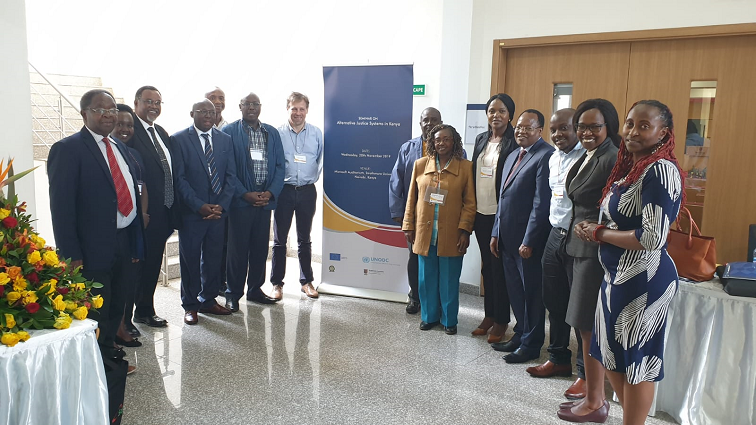
29 Oct SDRC hosts seminar on Alternative Justice Systems
Strathmore Dispute Resolution Centre (SDRC) hosted a seminar on Alternative Justice Systems (AJS) on 21st November, 2019 at the Microsoft Auditorium. The seminar brought together about 50 experts, academics, researchers and practitioners working in various disciplines related to AJS practices in Kenya. The seminar was organised by the Judiciary Alternative Justice Systems taskforce with funding from the United Nations Office on Drugs and Crime (UNODC).
Article 159
Recognising Article 159 of the Constitution of Kenya 2010, that judicial authority is derived from the people and vests in, and shall be exercised by, the courts and tribunals established, as well as the reality that the practice of Alternative Justice Systems (AJS) has been documented as a preferred mode of accessing justice in Kenya, the Judiciary taskforce on Traditional, Informal and Other Mechanisms Used to Access Justice in Kenya (AJS) was appointed. The AJS taskforce is chaired by the Hon. Mr. Justice (Prof.) Joel Ngugi; a key objective of the taskforce is to develop a policy to mainstream AJS with a view to enhancing access to and expeditious delivery of justice providing for court-annexed cultural alternatives to mainstream justice processes in appropriate circumstances.
The seminar was a key activity in the taskforce’s work plan towards the development of a Judiciary AJS Policy. The taskforce is mandated to convene stakeholders and practitioners in AJS to map out and understand the prevalence and utility of an AJS, its intersection with the formal justice system, and the constitutional prerogatives in regard to AJS. It is expected that the debates and knowledge shared during the seminar will contribute to the AJS policy framework being developed by the AJS taskforce.
The seminar generated and crystallised knowledge and ideas from which transformative and sustainable policy decisions on AJS can be grounded. The outcome was a policy framework informed by intellectual reflection, empirical evidence, and practical experience in the administration of AJS mechanisms in Kenya in consonance with the expectations of the people of Kenya and the principles of the Constitution of Kenya 2010.
Range of stakeholders
The participants represented a range of stakeholders including Strathmore University, Kabarak University, Moi University, University of Nairobi, Kenyatta University, the Judiciary, the Office of the Director of Public Prosecutions, the National Police Service, the Law Society of Kenya, the National Land Commission, Kenya National Commission on Human Rights, the Federation of Women Lawyers Kenya, the National Council of Elders, Civil Society Organisations including Legal Resources Foundation, Kituo Cha Sheria, ICJ Kenya, and Development Partners including UNDP Kenya, GIZ Kenya, UNODC, World Bank and IDLO.
The seminar employed a participatory round-table format with less emphasis on the presentations and more emphasis on discussions and plenary sessions. Feedback and recommendations on the questions raised from the topic presenters were crucial to the exercise. Importantly, participants were given an opportunity and encouraged to critique the policy positions being proposed by the AJS taskforce and, most importantly, critically interrogate the theoretical frameworks relied upon by the taskforce in the development of its policy prescriptions and recommendations.
Practices of AJS
The seminar was divided into three themes and discussion subjects: Theories of AJS, the practice of AJS in Kenya and intersections between AJS & the formal justice system in Kenya. It included discussions such as: A pedagogy for AJS: Interactions between knowledge and practice of AJS; A Constitutional framework of AJS in Kenya; Role of elders in AJS practice in Kenya; Perspectives from Legal Practice and Perspectives from Criminal justice system actors.
This article was written by Agage Benjamin, a student at the Strathmore Law School.
If you have a story, kindly email: communications@strathmore.edu

No Comments